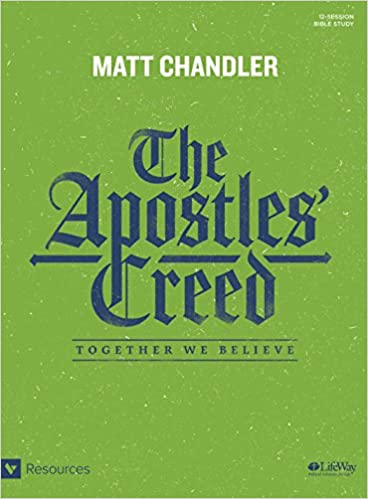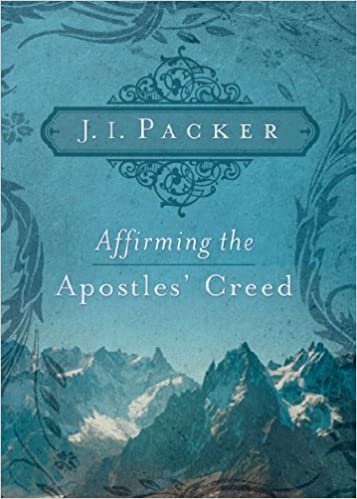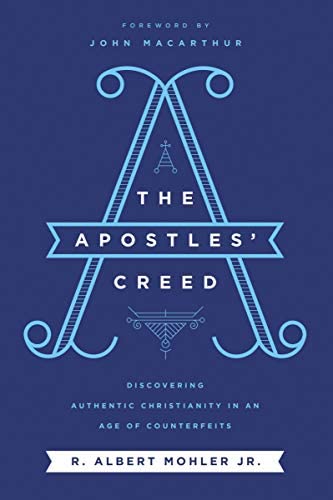Click here to return to Blog Post Intro
The Apostles’ Creed: A Guide to the Ancient Catechism by Ben Myers

Who was Conceived by the Holy Spirit

Jesus Christ is born of a woman: He is conceived by God’s Spirit. This way of thinking about Jesus’ humanity and divinity is really just an attempt to make sense of the complex things that are said about Jesus in the Gospels.
When the Spirit broods over the womb of Mary, we see a picture of God’s creative work happening all over again. Jesus is brought into being by the creative breath of God’s Spirit.
Jesus is the bearer of the Spirit and the sender of the Spirit. In him, the Spirit creates a new beginning for the whole human race. That is what the church proclaims in the concise but astonishing words of the ancient catechism: “conceived by the Holy Spirit.”
Born of the Virgin Mary
If we take the virgin birth out of context and in isolation, we might conclude that it’s just a spectacular miracle or even a logical absurdity. In fact, there are Christians today who believe the virgin birth is a relic of bygone days when people were simpler and found it easier to believe in impossible things.
To understand the virgin birth, we need to see how it fits into the whole story of Scripture. Israel’s story begins with a promise to Abraham and Sarah (Genesis 12-17). A couple who cannot conceive are chosen by God and told they will have a great family. When Sarah gives birth in her grand old age, the child is named Laughter (Hebrew: Isaac) because of the astonished joy of his parents.
The next turning point in Israel’s story is the arrival of Moses (Exodus 2:1-10). Although Moses’ conception is not a miracle, his infancy is marked by a miraculous escape from danger.

When Israel comes to the promised land, before the establishment of the monarchy, God raises up judges to lead the people. The greatest of the judges is Samson, and his story begins with another miraculous birth (Judges 13:1-25). Samson’s mother is unable to conceive. But she is visited by an angel who tells her that she will give birth to a savior who will triumph over the Philistines.
After the age of the judges comes the age of the prophets and kings. It begins with Hannah, a woman full of grief because she cannot bear children (1 Samuel 1:1-20). In answer to her prayer Hannah becomes miraculously pregnant and her child Samuel becomes the prophet who will anoint the first kings of Israel.
This is how it goes in the Old Testament: at the great turning points of history, we find a woman, pregnant, and an infant child brought into the world by the powerful promise of God. Israel’s story is a story of miraculous births.
Against this backdrop, it should come as no surprise to find Israel’s Messiah entering the world by means of a miraculous pregnancy. The confession that Jesus Christ was born of a virgin is a reminder that our faith has deep roots in Israel’s story and Israel’s Scriptures.
The Apostles’ Creed: Together We Believe by Matt Chandler

The Bible says the Holy Spirit would “overshadow” Mary to enable her to conceive a son. In the Greek translation of the Old Testament, the same word for overshadow is used to describe the cloud of God’s glory in Exodus 40:35, where the Bible says, “Moses was not able to enter the tent of meeting because the cloud settled on it, and the glory of the Lord (shekinah) filled the tabernacle.”Luke connected the shekinah glory of God to the conception of Jesus.
In the birth of Jesus, we see God entering our world in a beautiful and unexpected way. An early church theologian named Athanasius described God’s incarnation this way: “He entered the world in a new way, stooping to our level in His love and Self-revealing to us.” The very God of the universe humbled Himself by taking on Himself total humanity in its weakest form, a baby.
Belief in the virgin birth is essential in shaping the Christian life. It testifies to the nature of Jesus as both God and man, as well as to the fact that we have an all-powerful Father who interacts with His creation to make Himself known.
Reflect on the confession and plea of the father in Mark 9:24, “I believe; help my unbelief!” Cry out to God, making this your prayer. Be specific about the areas in which you need to trust Him.

Affirming the Apostles’ Creed by J. I. Packer

Born of the Virgin Mary
The virgin birth serves as a strong witness against humanitarianism—the view that Jesus was just a fine man. With the virgin birth, Jesus did not inherit the guilty twist called original sin: his manhood was untainted, and his acts, attitudes, motives and desires were consequently faultless.
“Conceived by the Holy Spirit, born of the Virgin Mary” in the Creed witnesses to the reality of the Incarnation, not the glory of Jesus’ mother. Mary was a virgin until after Jesus’ birth. The Gospels show that Jesus had brothers and sisters (Mark 3:31; 6:3).
And Mary saw herself as a saved sinner. “My spirit hath rejoiced in God my Saviour” (Luke 1:47). She sets a marvelous example of cooperating in God’s plan to bless the world (Luke 1:38; 2:34-35) and a humble response to God’s grace.
The Apostles’ Creed: Discovering Authentic Christianity in an Age of Counterfeits by R. Albert Mohler, Jr.

The Scriptures teach nothing less than the virgin birth of Jesus Christ. Indeed, without such a birth there is no gospel! A Christian who doesn’t believe in the virgin birth is in eternal peril, for the one in whom he believes is not the One who is testified in the Scriptures.
The Apostles’ Creed has included the virgin birth for good reason—it is true, it is essential, and it is glorious. Without the virgin birth, Christ is not God. For Jesus to save, Jesus must be both God and man, and in order to achieve this union between God and humanity, Jesus must be conceived by the Holy Spirit and born of the Virgin Mary.
Although the church has affirmed the virgin birth of Christ for 2,000 years, in the last 200 years, some have labeled the virgin birth a scandal. Modern skeptics like retired Episcopal bishop John Shelby Spong have argued that these doctrines are just evidence of the early church’s invention of Christ’s deity. The virgin birth is, Spong explains, the “entrance myth” to go with the resurrection, the “exit myth.”
Christians have always insisted that there is something qualitatively different about Jesus that sets him apart from all other religious teachers or thinkers. And the Bible is clear. Both Matthew and Luke support the virginal conception of Jesus. Matthew says, “Before they came together, she was found to be with child from the Holy Spirit” (Matthew 1:18). Luke emphasizes that Mary was a virgin by repeating it three times (Luke 1:27; 1:34; and 1:35).
Consider these three implications of the virgin birth:
- The virgin birth affirms the true identity of Christ as truly God and truly man.
- The virgin birth points to the miracle by which this child is conceived without sin.
- The virgin birth accentuates the miraculous nature of God’s redemption.
Those who deny, ignore, or explain away the virgin birth struggle to explain in any meaningful sense the divinity of the Son and the majesty of the incarnation.
The truth of the virgin birth creates a moral obligation. Because Scripture affirms the virgin birth, then it is true; and if it is true, then it must be believed. To deny the virgin birth—despite the fact that the Gospels assert it—would compromise the authority of Scripture.
Do you believe that Jesus Christ was “conceived by the Holy Spirit and born of the virgin Mary”?

